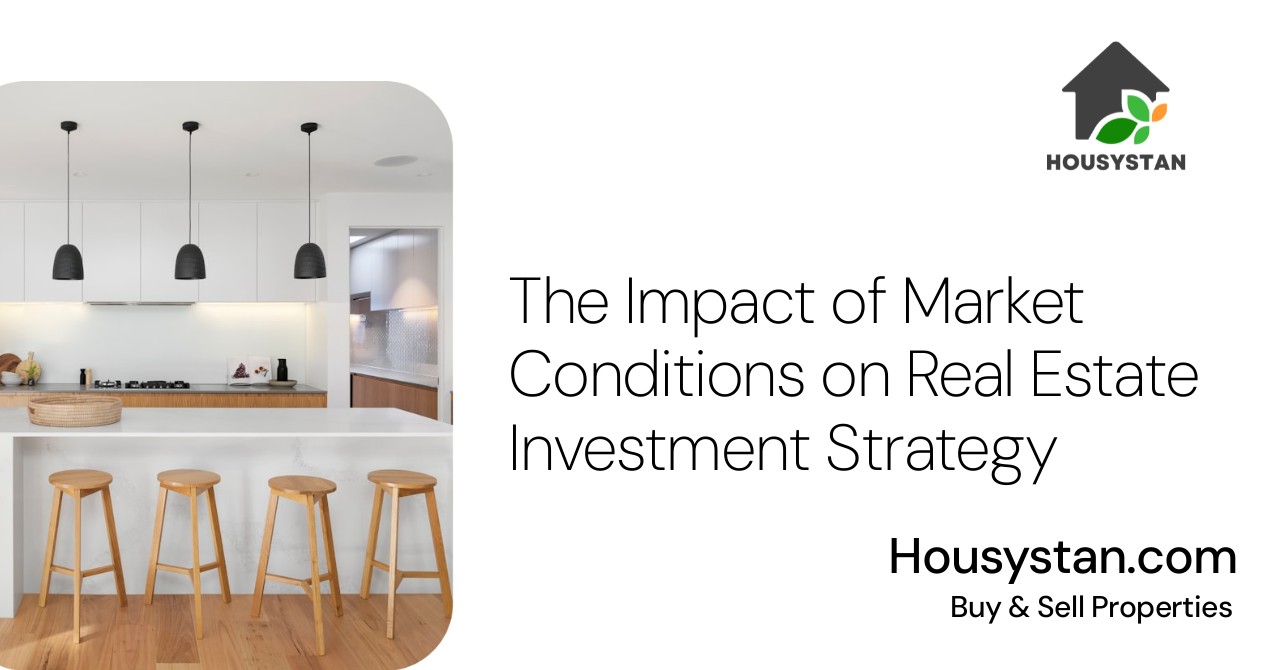The Impact of Market Conditions on Real Estate Investment Strategy
Read latest blogs and articles from Housystan

The Information mentioned here was last updated on:
29/1/2026The Impact of Market Conditions on Real Estate Investment Strategy
The real estate market can seem as volatile as any financial investment avenue, fluctuating based on numerous factors that can profoundly influence investment strategies. Whether you're a novice looking to make your first purchase or a seasoned investor seeking to refine your portfolio, understanding the market conditions that impact real estate is crucial.
1. Understanding Market Cycles in Real Estate
- Verified Tenants/Buyers
- Unlimited Property Listing
- Zero subscription/charges fee
Real estate markets, like any other markets, go through cycles. These cycles are generally categorized into four stages: recovery, expansion, hyper-supply, and recession.
- Recovery: This stage comes after a market downturn. During this phase, there are signs of growth, albeit slowly. Properties may still be undervalued, and investments made in a recovery phase can yield significant returns as markets improve.
- Expansion: Characterized by increasing demand, higher prices, and properties selling rapidly. This stage is marked by low vacancy rates and high property value growth.
- Hyper-supply: During this period, supply begins to overtake demand. It is characterized by high vacancy rates and stagnant prices, leading cautious investors to pull back.
- Recession: This phase follows hyper-supply when economic growth slows. Property values may decrease, and market activity will likely slow down. This stage can present bargain opportunities for the wise investor with long-term strategies.
It’s crucial for investors to identify which stage the market is in, as this can help tailor investment strategies to maximize returns and minimize risks.
2. Key Market Conditions to Watch
When evaluating real estate investments, here are some crucial conditions that can impact decision-making:
- Interest Rates: Low-interest rates often spur investments in real estate because borrowing costs are reduced. Conversely, high-interest rates can dampen investment due to increased mortgage costs.
- Economic Growth: Booming economic environments often lead to increased demand for real estate due to higher employment rates and stronger consumer confidence.
- Inflation: Inflation can erode purchasing power but can also increase property values over time. Understanding the interplay between inflation and real estate can position investors to hedge against inflationary pressures.
- Government Policies: Tax incentives, subsidies, and regulations can all influence real estate markets. Investors must stay updated with changes in policy to make informed decisions.
- Demographics: Population growth, migration patterns, and household income levels all impact the demand for different types of properties, from residential to commercial.
3. Strategic Approaches to Real Estate Investment
Each market condition can define the approach an investor might take. Here are some strategies tailored to various market conditions:
- Buy-and-Hold Investments: Suitable during periods of low-interest rates and economic growth, this strategy focuses on purchasing properties expected to grow in value over time.
- Fix-and-Flip: Often employed in expanding markets, this strategy involves buying undervalued properties, renovating them, and selling them at a profit.
- Rental Properties: Considered a stable revenue stream during any part of the market cycle, but especially lucrative when interest rates are low and rental demand is high due to economic factors.
- Real Estate Investment Trusts (REITs): For those who prefer a less hands-on approach, investing in REITs provides exposure to real estate markets without directly buying properties. It's a good option in any market cycle and allows for diversification.
For a more comprehensive strategy, consider combining several approaches to mitigate risks. For example, engaging in a mix of buy-and-hold and rental strategies could offer both capital appreciation and steady income.
4. Leveraging Technology and Data
Harnessing technology can offer investors critical insight into market conditions. Here are a few ways technology is transforming real estate investment strategy:
- Big Data Analysis: Analyzing large data sets can reveal trends and insights that inform investment decisions, such as neighborhood growth patterns or property appreciation rates.
- AI and Predictive Analytics: These tools predict future market trends and property values, aiding in strategic decision-making.
- Online Platforms: Use these to research properties, assess market conditions, and even conduct transactions. This can save time and provide access to a broader range of opportunities.
Engaging with technology enhances an investor's ability to make informed, timely decisions, improving their overall strategy in tune with market dynamics.
5. Preparing for the Unpredictable
While some market conditions are predictable, others can change rapidly due to unforeseen events such as natural disasters, changes in government policy, or global pandemics. Investors should always be prepared for uncertainty by:
- Building a Financial Cushion: Have reserves that cover unexpected costs, ensuring the ability to hold onto properties through downturns.
- Diversification: Spread investments across different property types and geographic locations to mitigate localized risks.
- Regular Market Reviews: Keep abreast of market trends and adjust strategies promptly as conditions evolve.
To consistently manage risk and seize opportunities, maintaining flexibility in investment strategies and staying informed is vital.
By closely monitoring these factors and market conditions, investors can navigate the complex world of real estate with a strategic and informed approach. With the right strategies in place, the impact of market conditions can be leveraged to develop a robust and profitable real estate investment portfolio.